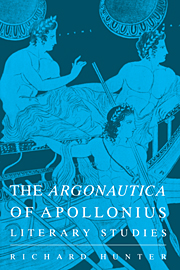Book contents
- Frontmatter
- Contents
- Preface
- List of abbreviations
- 1 Introduction
- 2 Modes of heroism
- 3 Images of love
- 4 The gods and the divine
- 5 The poet and his poem
- 6 The Argonautica and its Ptolemaic context
- 7 Argonautica and Aeneid
- Appendix: ἓν ἂισμα διηνκές: Aristotle, Callimachus, Apollonius
- Bibliography
- General index
- Index of passages discussed
- Frontmatter
- Contents
- Preface
- List of abbreviations
- 1 Introduction
- 2 Modes of heroism
- 3 Images of love
- 4 The gods and the divine
- 5 The poet and his poem
- 6 The Argonautica and its Ptolemaic context
- 7 Argonautica and Aeneid
- Appendix: ἓν ἂισμα διηνκές: Aristotle, Callimachus, Apollonius
- Bibliography
- General index
- Index of passages discussed
Summary
EPIC CHARACTER
For many readers of poetry ‘epic’ and ‘heroic’ are virtually synonymous terms; epics, after all, are about heroes. Achilles is named, and Odysseus and Aeneas alluded to, in the opening verses of the epics devoted to their deeds. At one level, the Argonautica, which is to tell of the ‘glorious deeds of men of old’ (I.I), follows the pattern, although Jason does not actually enter the poem until the sixth verse. The Argonauts, like Homer's heroes, belong to Hesiod's age of ‘semidivine heroes’, and during the classical and Hellenistic periods some of them in fact received cult honours as ‘heroes’ in the technical sense of Greek ritual; the hymnic coda with which the poem ends makes a clear allusion to this status. Nevertheless, many modern readers have wished to deny ‘heroic’ status to Apollonius' characters and to his poem. This is not just the result of a consideration of the difference between oral and written epic – that is, the belief (in my view mistaken) that only the former can be truly ‘heroic’ – but also arises from various specific contrasts between the Argonautica and the Homeric poems.
One is the centrality of death in the Iliad, most famously expressed in the great speeches of Achilles and the haunting words of Sarpedon to Glaukos in Iliad 12:
‘Dear friend, if we were going to live for ever, ageless and immortal, if we survived this war, then I would not be fighting in the front ranks myself or urging you into the battle where men win glory. […]
- Type
- Chapter
- Information
- The Argonautica of Apollonius , pp. 8 - 45Publisher: Cambridge University PressPrint publication year: 1993



